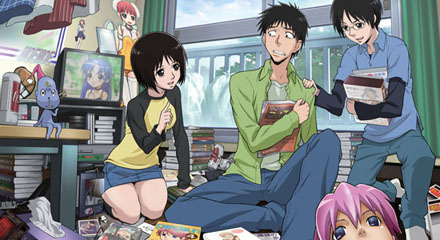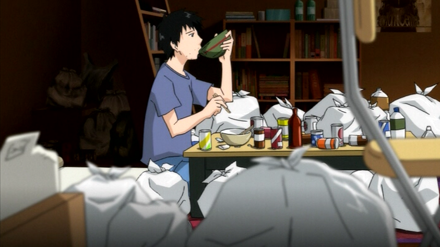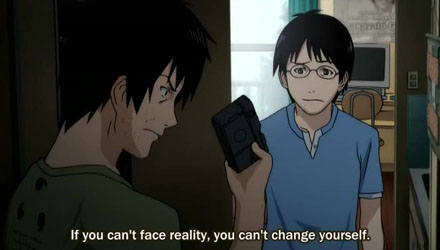 If you’ve followed my Tumblr, you know that I did indeed manage to apply to 30 jobs in as many days. But since I haven’t found a job yet, I’m going to keep going through December.
If you’ve followed my Tumblr, you know that I did indeed manage to apply to 30 jobs in as many days. But since I haven’t found a job yet, I’m going to keep going through December.
It’s fitting that I finished watching Welcome to the NHK at the same time as I finished NaNoJobMo. I say this because NHK had a lot to do with what I’m going through right now. I’m going to talk plainly, so if you haven’t finished NHK yourself, let this be your giant spoiler alert!
Still want to read my pseudo-review? Okay. There’s two parts of NHK that I want to discuss.
First, I think the message of NHK is that being a hikikomori NEET is not a disease, but a privilege. Not just anyone can hole up in their room playing games all day and being served food. A NEET needs enablers to pay a stipend so they can stay fed, clothed and under a roof. When these things come unraveled (as they do for two different NEETs in the series), the afflicted are suddenly able to find the strength to leave the house and start working a job, any job.
This applies to my life by reminding me how lucky I am. Like Sato throughout most of the series, I don’t have to work anything bigger than my job at the gym right now in order to survive. I can afford to spend an entire month applying to jobs without worrying about whether I’ll eat today. I wouldn’t say I’m a NEET since I would rather be working, but it’s the same premise.
Second, I was very affected by the eroge sub-plot. I loved when Sato and Yamazaki decided to create their own dating-sim video game. It may have been a porn game, but it’s something that Sato got really into creating. When Sato spent late nights working on the eroge script, his realization was my own — “As long as I am working toward something I care about, I am not a NEET.” In that moment, Sato has found his career.
It’s a beautiful turning point in the series. Even though the eroge never amounts to anything profitable, what matters is how much he cared about creating it. This is how I feel about my various blogs: this one, NaNoJobMo, and Japanator. Even though I haven’t found a job yet, I’ve found a rewarding career.
Readers, do you have a job that is different from your career? Also, what did you think of Welcome to the NHK?


4 Comments.
Welcome to the NHK is in my top five favorite anime of all time. I absolutely love the characters, and I go crazy for nearly any series with Yui Makino voicing and/or singing. But what I really enjoyed most was how most of the story arcs balance their sad little tragedies with themes of hope and redemption.
It’s also a series I’ve found I can show non-anime fans to get them more interested in anime. Or to scare them away from it forever!
P.S. Puru Puru Pururin~~~
Believe it or not, I watched the whole thing dubbed. I’ll have to go back and listen to Yui Makino’s delivery. I’m working on a blog post about “Anime for Your Friends Who Don’t Like Anime” and maybe I’ll have to reconsider this one!
Also, I need to make Pururin my cell phone tone.
I really liked NHK because I feel like I can relate to the main character somewhat. He’s got an extreme case of social anxiety but I feel like most anime fans and people have had those times where we’ve felt like outsiders or just a little bit more eccentric then the next person. Also for something as simple and slice of life as this it also has plenty of comedy, drama and emotion.
I’d have to say NHK is one of few series that I’ve seen that has superb character development. Your attachment to the character at the end is unparalleled.
[…] I watched this for the first time in 2010 when I was at the lowest ever point in my career—essentially, before it had even begun. I was a gym cashier with a Master’s degree, living at home with my parents, wondering why I couldn’t get a real job being that the recession was supposed to be over. This time, all the things I found comforting before seemed a little too convenient: Misaki’s need, Sato’s many second chances to successfully complete an eroge. There’s a little bit of luck when it comes to life, but most of it is hard work. […]